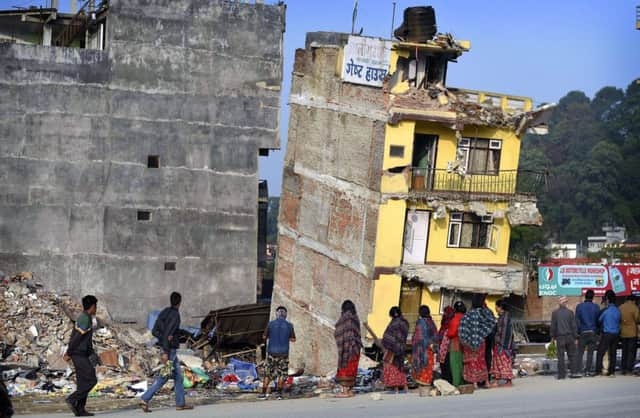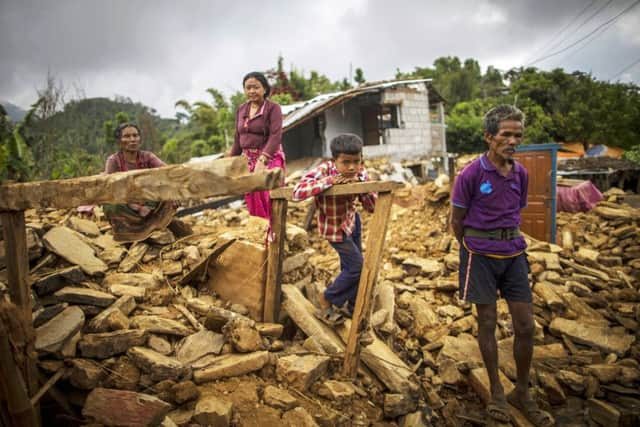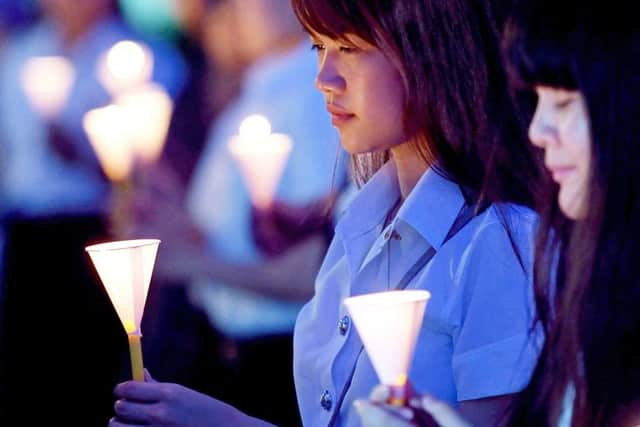Scots doctor tells of Nepal earthquake horror


At the Beatson West of Scotland Cancer Centre, where I work, we have more than 50 consultants to look after a population of two million people.
Compare this with Nepal, where 50 doctors with cancer care knowledge provide treatment for 28 million people.
Advertisement
Hide AdAdvertisement
Hide AdI was part of a team of four British and Irish doctors and a radiographer who travelled to Nepal. The four doctors were Aileen Flavin, Jane Barrett from Reading, myself and Aileen’s friend Bernadette O’Shea, who came to sight-see. The fifth member of the party was Libby Richards, a senior radiographer.


We arrived a few days early to give us time to sight-see. We managed to see Durbar Square, Kathmandu, and the centre of Bhaktapur before they were flattened.
The earthquake occurred on the second day of teaching, around midday. The workshop was being held on the fifth floor of the Yellow Pagoda Hotel. Just before, there was a sudden eeriness and then a “werewoooooosh” noise.
The lights failed, all went quiet then the sway began, initially slight, then the main movement rocking the walls.
I was halfway through my presentation when the earth moved.


What do you think in an earthquake? If you are me it was along these lines: “This is not an earthquake, could it be a gas explosion? No, this is an earthquake.”
There were voices: “Get down, get down.” We were crouching under tables waiting for it to end. A young female consultant oncologist was crying “Oh my god, Oh my god”. Men were shouting: “Everyone down the stairs.”
The main shock was over but there would be an aftershock. The stairs were still intact. It was time to get out. I was at the front of the hall, furthest from the exit. Voices called: “Don’t take anything, just get out, get out.”
I decided there was a little time and a disaster zone without a passport would be too difficult, so I went to get my bag. The computer was disposable.
Advertisement
Hide AdAdvertisement
Hide AdMy legs didn’t move fast enough, I had had a bout of the infamous travellers’ sickness. My body would not sprint even for an earthquake. “Move faster, hurry, madam, hurry,” I’m told, but was it fast enough?
In the street everyone was in the middle of the road, asking one another: “Are you alright, is your family alright?”
The mobile phone signal was still working. Our hosts checked that we were all safe then left for the hospital to wait for news.
We remembered Bernadette. Was she sight-seeing? There was no reply from her mobile, probably just no signal.
How long do you wait in the middle of a crossroads? Aftershocks go on for days but could we get another earthquake? Why don’t I know more about earthquakes? Where is Bernadette? We decided to go back to the hotel to find her.
Along the street, we found the electric cables are down, a car crushed under their weight, the cables crisscrossed along the street, so we found another route. We walked along the middle of the main road back to the Kathmandu Guest House, but there was still no sign of Bernadette. Everyone was outside the hotel. Dev Dangi, the owner said no-one was allowed back into the building for three hours. He gave us water.
The aftershocks continued. Suddenly some mobile reception returned and we sent messages that we were safe.
More aftershocks, a large one just as the three-hour building curfew ended. Bernadette appeared – no need to deal with the awfulness of a missing person.
Advertisement
Hide AdAdvertisement
Hide AdThe hotel staff provided us with bowls of fried rice and fed everyone in the hotel compound, including some stranded gap-year students.
Day two and the reality of our situation was a little clearer. Medical colleagues from the radiotherapy workshops accepted our offer to help at the hospital.
One, Ambuj, had been there all night and was overwhelmed. At least 100 bodies were brought to the hospital in the first hour after the earthquake.
The hospital building was unsafe so staff set up operations in the car park. I was painfully aware of my lack of useful skills apart from putting in a cannula. I can’t fix a bone, it’s been 25 years since I did a chest drain. I was not a multi-talented Nepalese doctor.
There was nothing we could do to help. At night we heard the first of the planes arriving, hopefully with aid. Knowing we would just be using up precious resources, we decided it was better to leave. The hotel generator gave intermittent power and there was enough combined signal to text Jane’s husband who organised flights. The hotel had no phone line so could not take payment for our stay.
Rajan Sakya, on the reception desk, organised taxis. His beautiful face was solemn. “You are our guests, we must look after you, if you have money good, if you can arrange to send us money good, but you are our guests, your safety is our priority,” he said.
On the way to the airport, it was still dark. There were tents in every open space and people camped round fires by the roadside. The airport was mobbed, throngs of sleeping bodies outside and inside after dozens of flights were cancelled. We found check in. We boarded the plane and entered a world of luxury.
• Diana Ritchie is a consultant clinical oncologist.